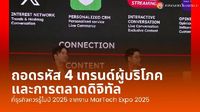In the rapidly evolving landscape of advertising, 2025 is shaping up to be a pivotal year as businesses increasingly leverage the power of data, MarTech, and artificial intelligence (AI) to connect with consumers. This year's MarTech Expo showcased significant trends that reflect the changing dynamics of consumer behavior and marketing strategies.
Organized by the popular advertising page AD Addict, the expo highlighted the latest advertising trends and innovations. A notable collaboration from the previous year was the RED CUP Creative Award, sponsored by Nescafé, aimed at engaging professionals in the advertising industry, particularly those in agencies.
According to industry reports, the advertising market is witnessing a resurgence with a projected growth rate of 4.5% following a downturn during the COVID-19 pandemic. Digital advertising is particularly booming, while traditional television advertising continues to decline. Despite this shift, TV still holds a significant share of the advertising budget.
At the MarTech Expo, experts discussed four key consumer behavior trends that are shaping digital marketing strategies in 2025. The first trend, termed “consumer fatigue,” indicates that consumers are overwhelmed by the rapid pace of technological advancements. As new applications emerge—over 1.4 million globally each year—users find themselves increasingly reluctant to learn new systems unless absolutely necessary. This is reflected in the declining average usage of apps, which is expected to drop from 18.45 to 17.8 by 2027.
In response, businesses are encouraged to revisit their strategies and focus on simplifying user experiences. By honing in on essential functions that consumers are already familiar with, companies can avoid unnecessary complexities that may deter engagement. Experts suggest that introducing new technologies should involve personal interactions, such as employee-led tutorials, rather than relying solely on digital communications.
The second trend highlights the changing landscape of loyalty programs. Traditional models, which often focus on discounts and freebies, are failing to resonate with modern consumers who prioritize value and brand loyalty. Many consumers are now driven by the best deals available, ready to switch brands if a more appealing option arises. Thus, businesses are advised to shift their perspective from merely offering incentives to fostering deeper emotional connections with their customers.
For loyalty programs to succeed, they must be multi-dimensional, combining tangible rewards with emotional engagement. For example, programs that provide financial education or tax management assistance can create added value beyond the product itself, cultivating trust and loyalty among consumers.
As cyber threats and data breaches become more prevalent, the third trend emphasizes the need for brands to establish credibility. Today's consumers are more cautious and expect brands to prioritize data security and transparent communication. Businesses should focus on three key areas: investing in cybersecurity to protect customer data, addressing issues transparently and promptly, and maintaining a professional image to build trust.
The final trend discussed at the expo relates to content creation across various platforms. As consumers engage with different platforms—such as Facebook, Instagram, TikTok, Shopee, and Lazada—for distinct purposes, a one-size-fits-all approach to content is no longer effective. Brands must adapt their strategies to create platform-specific content that resonates with each audience, requiring a nuanced understanding of each platform's unique characteristics.
In summary, the four trends identified at the MarTech Expo reflect a future where marketing is driven by empathy, strong relationships, and the strategic use of technology. While MarTech tools are becoming increasingly important, the essence of successful marketing lies in understanding and addressing the human aspects of consumer behavior.
As businesses navigate these trends, adapting to the evolving landscape is not just an option but a necessity for sustainable growth and success in a rapidly changing marketplace.



